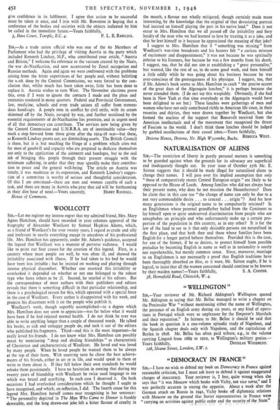WOOLLCOTT
Sra,—Let me register my intense regret that my admired friend, Mrs. Mary Agnes Hamilton, should have recorded in your columns approval of the biography of Alexander Woollcott by Samuel Hopkins Adams, which, as a friend of Woollcott's for over twenty years, I regard as crude and silly and irrelevant in nearly everything except its anecdotes of his professional life. Mrs. Hamilton has apparently, under Mr. Adams's guidance, accepted the legend that Woollcott was a monster of perverse rudeness. I would like to point out four causes for the creation of this legend. First, in a country where most people are well, he was often ill, and showed the irritability associated with illness. If he had taken to his bed he would have been less irritable ; but he insisted on working and playing through intense physical discomfort. Whether one resented this irritability or overlooked it depended on whether or not one belonged to the robust type who hates others to be ill. Second, he snarled at his editors. But the correspondence of most authors with their publishers and editors reveals that there is something difficult in that particular relationship, and there is a psychological reason for this, which operated with a special force in the case of Woollcott. Every author is disappointed with his work, and projects his discontent with it on the people who publish it.
Woollcott's work, though superbly accomplished—to a degree which Mrs. Hamilton does not seem to appreciate—was far below what it would have been if he had enjoyed normal health. I do not think he ever was able to write anything longer than a couple of thousand words. He talked his books, as sick and unhappy people do, and took it out of the editors who published his fragments. Third—and this is the most important—he really loved his friends. I do not know what Mrs. Hamilton can possibly mean by mentioning " deep and abiding friendships " as characteristic of Chesterton and uncharacteristic of Woollcott. He loved and was loved by many people. When he loved people he wanted them to be always at the top of their form. With unerring taste he chose the best achieve- ments of his friends, either in art or in life, and would speak to them or write to them about it. If they fell below their own standards he would rebuke them passionately. I have no hesitation in owning that during my twenty years of friendship with Woollcott he twice used language to me which was brutal and scarifying. In each case I deserved it. On both occasions I had overlooked considerations which he thought I ought to have recognised, and which, on reflection, I did. The fourth cause for this legend Mrs. Hamilton herself comes near recognising in her sentence : The personality depicted in The Man Who Came to Dinner is frankly &testable, and the long drawn-out joke left a bitter flavour of cruelty in the mouth, a flavour not wholly mitigated, though certainly made more interesting, by the knowledge that the original of that devastating portrait had insisted on himself playing the part in his native land." Does it not occur to Mrs. Hamilton that we all passed off the irritability and fiery loyalty of the man who we had learned to love by treating it as a joke, and that he lent himself to it because he appreciated the meaning of that joke?
I suggest to Mrs. Hamilton that if " something was missing " from Woollcott's war-time broadcasts and his hearers felt " a curious mixture of excitement and disappointment," it was not because he was spiritually inferior to his listeners, but because he was a few months from his death. I suggest, too, that he did not aim at establishing a " great personality," but wanted, like the rest of us, to do some good work, and bore himself a little oddly while he was going about his business because he was over-conscious of the grotesqueness of his physique. I suggest, too, that if Mr. Adams's book seems to Mrs. Hamilton to catch " the precise accent of the great days of the Algonquin lunches," it is perhaps because she never attended them. (I do not say this waspishly. Obviously, if she had been in New York at that time everybody at the Algonquin would have been delighted to see her.) These lunches were gatherings of men and women who have not only contributed richly to American life since, in their twenties and thirties, they were drawn together by Woollcott, but also formed the nucleus of the support that Roosevelt received from the American intellectuals and of the movement that recognised the threat of Fascism to the world. I don't think those lunches should be judged by garbled recollections of their casual jokes.—Yours faithfully,
Ibstone House, Ibstone, Nr. High Wycombe, Bucks. REBECCA WEST.


































 Previous page
Previous page